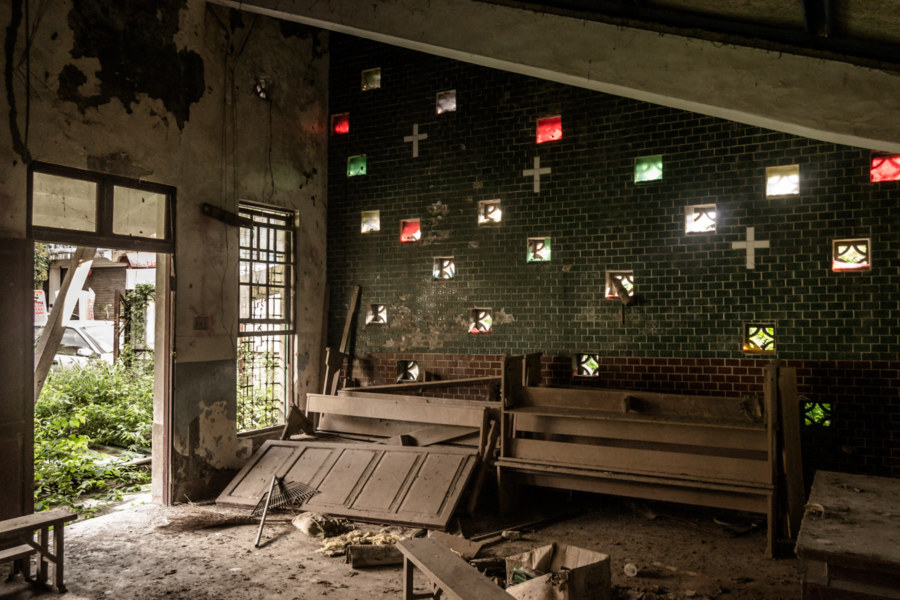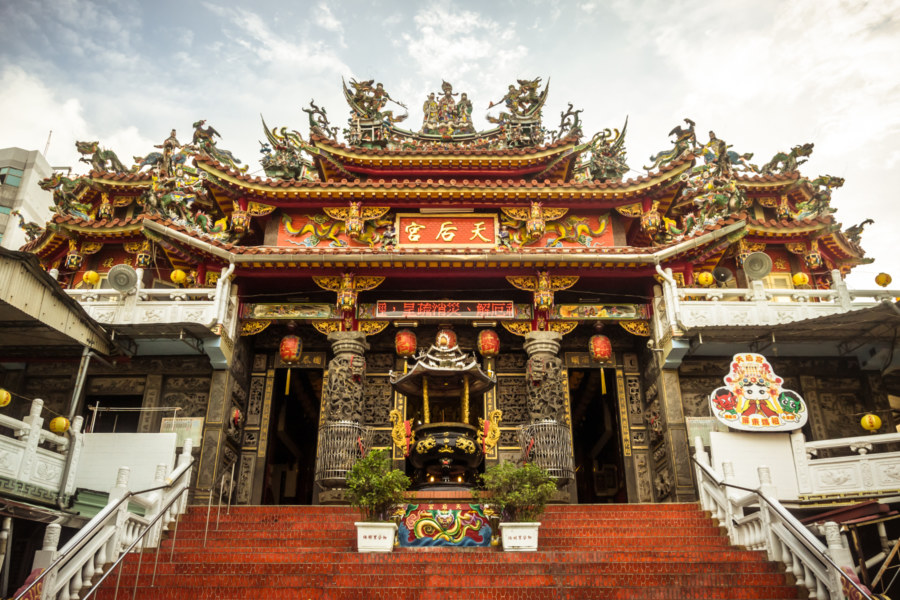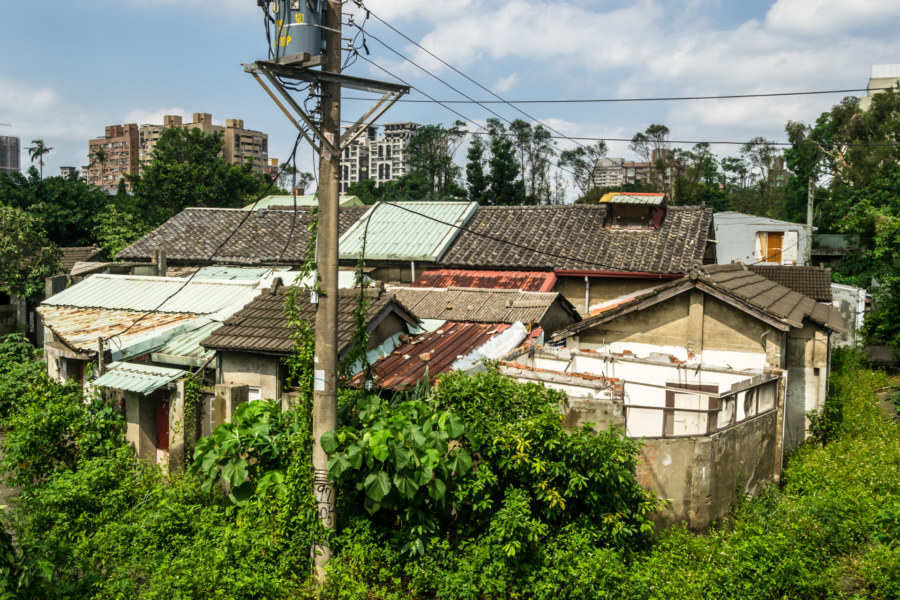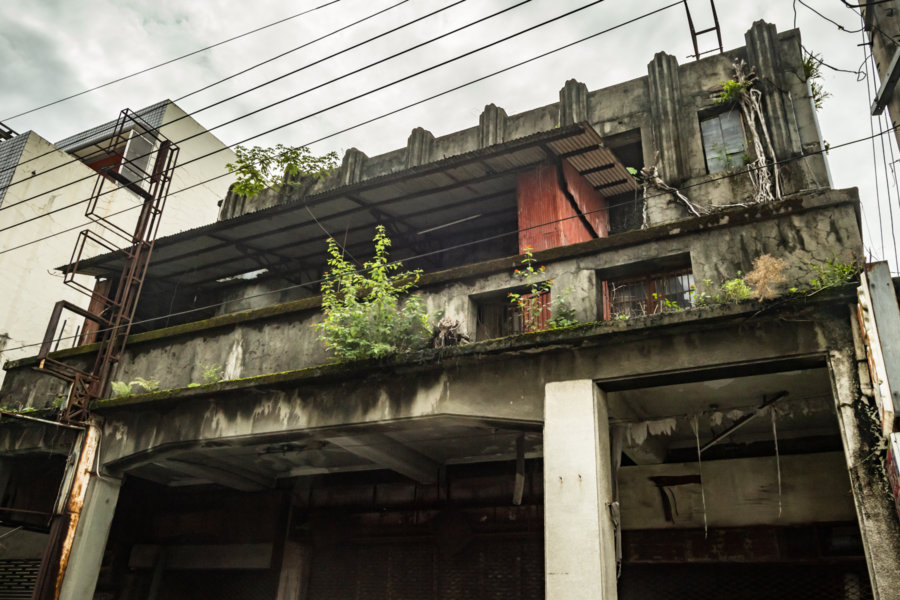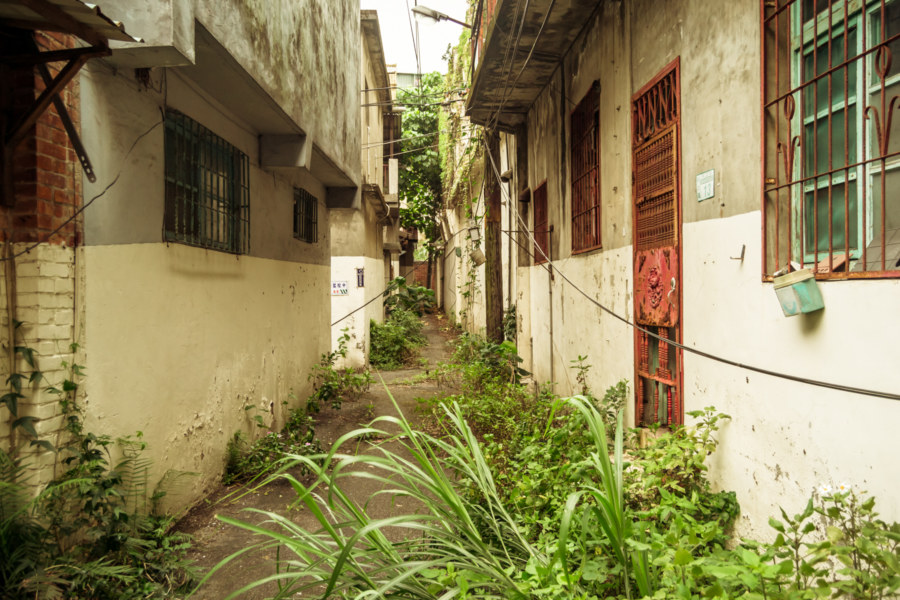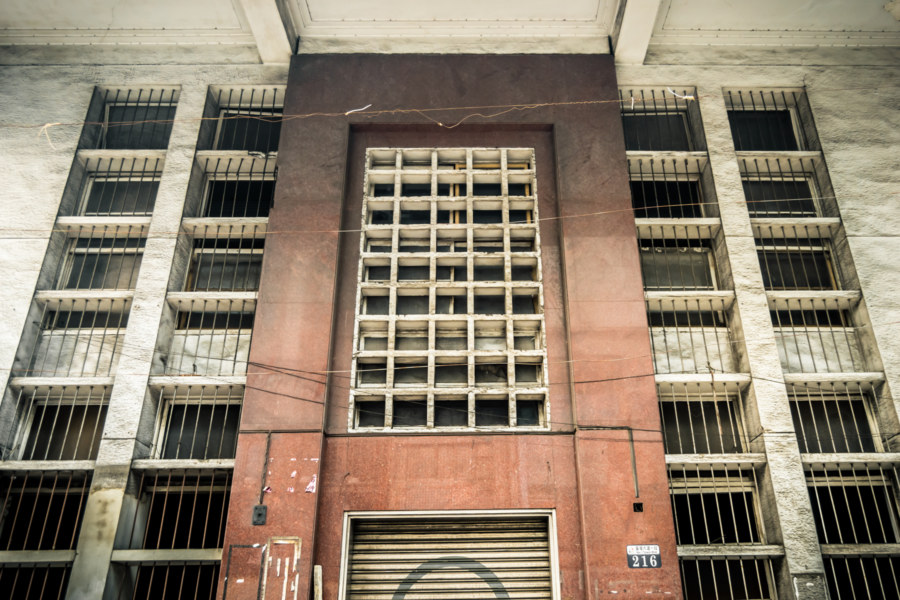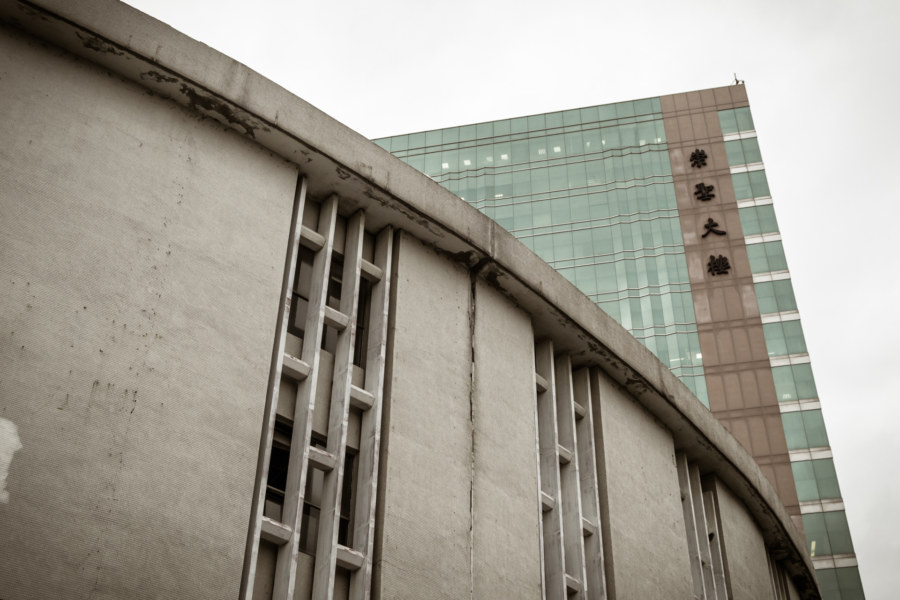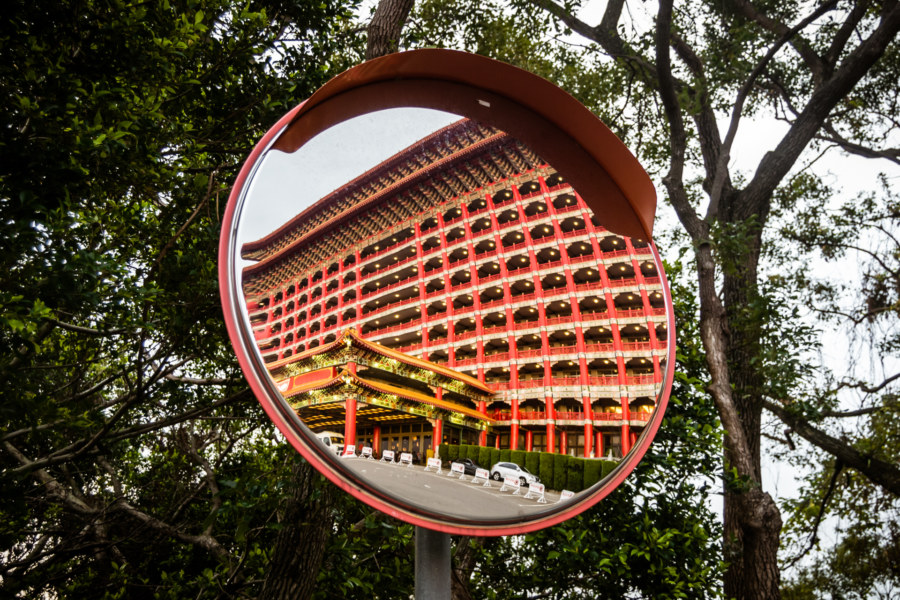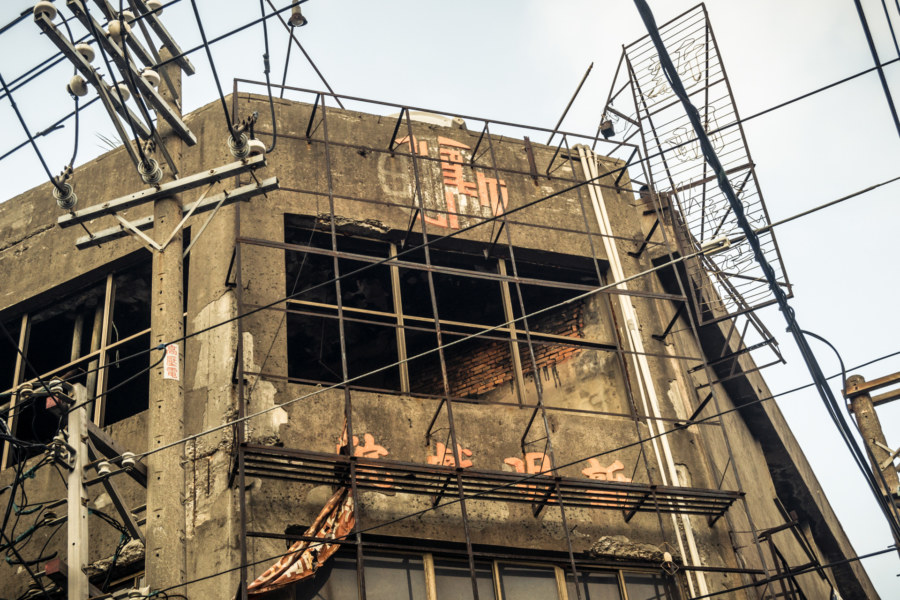Yonghe Theater 永和大戲院 is one of dozens of derelict movie theaters in Greater Taipei. Like hundreds of other theaters all around Taiwan this one went out of business in the early years of the new millennium due to changing consumer habits, a topic already discussed at length in previous explorations of places like Datong Theater 大同戲院 in Taitung City and Xinming Theater 新明戲院 in Zhongli. Whereas theaters in the rest of the country are often left to the elements, sky-high property values in the Taipei area strongly incentivize owners to do something with these decaying buildings. In this instance the front of the old theater was been converted for the use of into a 7-Eleven convenience store and an Italian restaurant by the name of Lan De Pasta House 嵐迪義大利麵. I wonder whether patrons of these establishments realize what looms overhead?
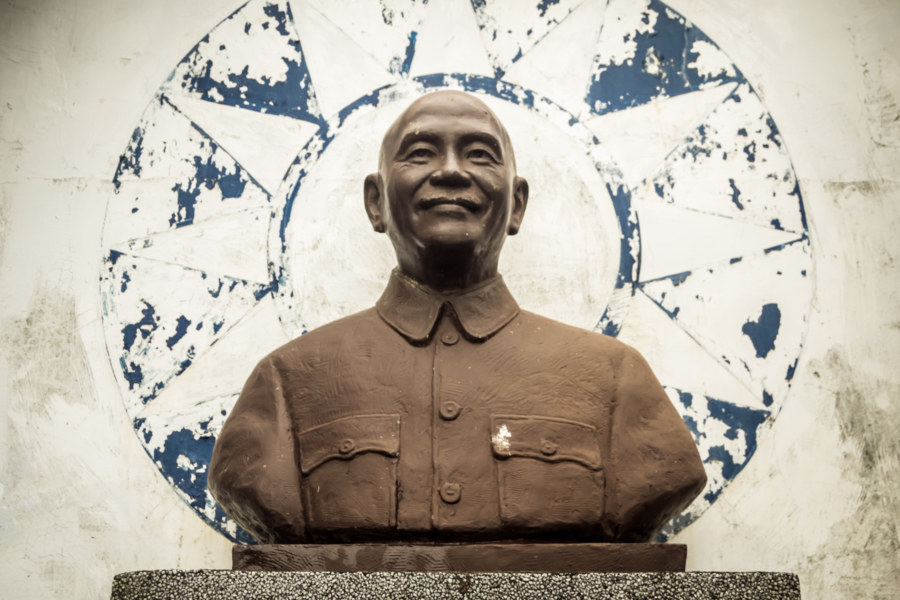
In the aftermath of World War II the Japanese authorities were expelled from Taiwan and the Kuomintang (KMT) invaded from China. Tensions between the local populace and the occupying force boiled over in the bloody February 28 Massacre in 1947, leading to the imposition of martial law and the beginning of the White Terror (白色恐怖) in 1949. For the purposes of this blog the time period from the end of the Japanese colonial era until the lifting of martial law in 1987 and its ultimate end in 1991 shall be referred to as the KMT authoritarian era.
Chaozhou Jiukuaicuo Catholic Church 潮州九塊厝天主堂
While I was out riding in southern Taiwan last year I chanced upon an abandoned church by the roadside in a small village outside of Chaozhou, Pingtung. I only spent about ten minutes there and didn’t shoot many photos but have since realized that the story to tell is interesting enough to devote a full post to it. The formal name of this place is Jiǔkuàicuò Catholic Church 九塊厝天主堂, though this is commonly prefixed with Chaozhou to distinguish it from the many other villages with the same name in Taiwan. Details are scant but I should be able to provide a broad overview of how this church came to be here—and why it was left to the elements.
Postcards From Pingtung City 屏東市明信片
One of the pleasures of bicycle touring in Taiwan is the freedom to change plans on impulse. On my second day of a trip down south in June 2015, having previously cycled across Kaohsiung from Tainan, I opted to hang out and see more of Pingtung City. A dire weather forecast calling for bouts of torrential rain had already introduced some uncertainty, but I was also curious about this city of 200,000, about which almost nothing is written in English. Finding an interesting place to stay sealed the deal—and so I checked out of a grimy hotel near the train station after breakfast, moved my stuff to the new place, and spent the day exploring the administrative center of Pingtung, the southernmost division of Taiwan.
Jiahe New Village 嘉禾新村
Jiahe New Village (嘉禾新村) is one of more than 800 military dependents’ villages (Chinese: juàncūn 眷村) built in Taiwan in the late 1940s and 1950s to provide provisional housing for KMT soldiers and their families fleeing from the Chinese Civil War. Approximately two million people crossed the Taiwan Strait from China from 1945 to 1949, bolstering an existing population of approximately seven million. More than 600,000 of these Chinese immigrants ended up in military villages like this one in Zhongzheng, Taipei, which was forcibly abandoned only a couple of years ago as part of a wave of urban renewal projects sweeping the nation.
Huaguo Theater 華國戲院
Huáguó Theater (華國戲院) is one of hundreds of abandoned theaters scattered around Taiwan. Located in Puli, a town of approximately 80,000 in the heart of Nantou, this particular theater was likely built in the late 1950s. From what I’ve read in an article by Wáng Hénglù (王亨祿), this theater was operated by a couple with the family name Zhōu (周) and specialized in showing Western films on a single screen before its inevitable demise.
Jiangling New Village 江陵新村
Jiānglíng New Village (江陵新村) was one of more than 800 military dependents’ village in Taiwan before its ultimate destruction in mid-2015. It was formerly located not far from the confluence of Jingmei River (景美溪) and Xindian River (新店溪) just outside Taipei city limits in the northern part of Xindian. Immediately to the south is an active military base of some kind—and the historic Jingmei Prison can be found on the opposite side of the nearest major intersection.
Taichung First Credit Union 台中第一信用合作社
Taichung First Credit Union 台中第一信用合作社 is a post-war bank located in Central Taichung. According to this blog it was abandoned in 2001. Last week I went to go take a quick look while surveying the many historic buildings in the area. There were construction workers setting up in front and there were no other points of entry so I did not gain access. Even so, from a quick look inside the place appears to have been cleared out—and they might even be preparing to renovate the building for one reason or another.
Second Taipei City Council Building 第二台北市議會大廈
One of the more peculiar ruins I’ve seen in Taiwan was a building immediately across from the Control Yuan (監察院), one of the five branches of government, on Zhōngxiào West Road (忠孝西路). It was inaugurated as the second home of the Taipei City Council (台北市議會) in 1964 after moving from nearby Zhongshan Hall (中山堂). In 1990 the city council relocated to its present base in Xinyi and the building was converted into a police station before being completely abandoned in 2007. Despite this the building continued to be known as the Second Taipei City Council Building (第二台北市議會大廈).
Taipei Grand Hotel 圓山大飯店
Yesterday’s impromptu ride around the riverside bikeway network delivered me to the palatial Grand Hotel (Yuánshān Dàfàndiàn 圓山大飯店), a famous landmark in Zhongshan, Taipei. Located on a hilltop overlooking a bend of the Keelung River (基隆河), it was established in 1952 at the behest of generalissimo Chiang Kai-shek to provide the ruling elite with a luxurious place to host and entertain foreign dignitaries. The distinctive building seen in these photos was completed in 1973 and was the tallest building in the Free Area of the Republic of China until 1981.
Zhongli Xinming Theater 中壢新明戲院
In the last year or so I have found and explored numerous abandoned movie theaters in Taiwan. It all started when I stumbled upon Datong Theater (大同戲院) in Taitung City last June. Since then I have learned much more about the Taiwanese cinema industry: how many theaters are likely to be found in a city of a given size, where they are likely to be found, when they were likely to have been abandoned, and so on. Not long after moving to Zhongli a few months ago I put this growing awareness to the test by cycling around town one morning, finding several theaters new to me, all within close proximity to one another. One of these, Xīnmíng Theater (新明戲院), is the subject of this post. Public records indicate the business was registered around 1980 and lapsed in 1997, though it almost certainly closed sometime before then.

